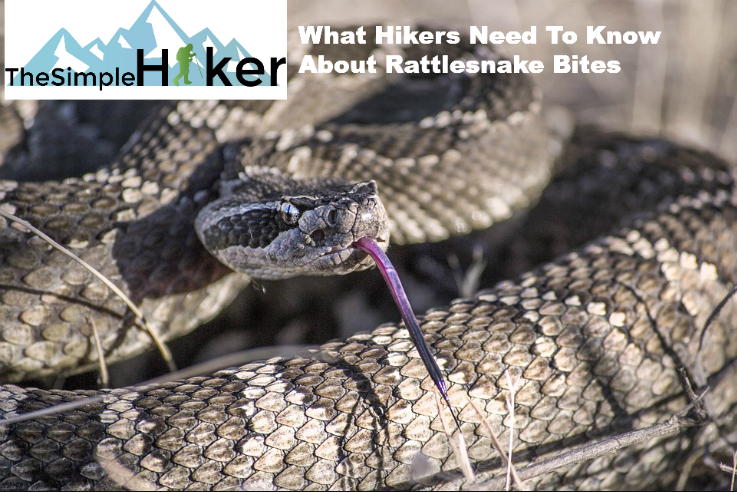Of all the different species of snakes, rattlesnakes are one of the most common venomous snakes that hikers will most likely encounter. Rattlesnake bites have the potential to cause serious complications to the body and may even lead to death. This is going to be part one on a series dedicated to hiking and rattlesnakes. For part one I’m focusing on what you as a hiker should know happens to your body after a rattlesnake bite and why you should head to the emergency room as soon as possible.
What Hikers Need To Know About Rattlesnake Bites
Rattlesnakes are on of the most common venomous snakes that a hiker will encounter. While their habitat can be throughout the entire United States, the regions that report the greatest number of venomous snake bites are: Texas, Florida, California, Arizona, Louisiana, Georgia, and North Carolina. Snakes are cold blooded and more active during the warmer weather months from Spring To Fall. Spring can be particularly troublesome because eggs are hatching and smaller snakes are more plentiful and also harder to see.
This family of which rattlesnakes belongs to is the most common cause of snake bites in the United States. About 5000 snake bites are reported to the American Association of Poison Control Centers each year. Most snake bites occur in adult males. Hospitalization occurs in about half of all envenomated patients. Reactions to venom from snake bites is more severe in children and about half of snake bites reported to the CDC are done by rattlesnakes and copperheads.
What Happens When A Hiker Is Bit By A Snake?
Not all snake bites result in venom going into the tissue. These are known as, “dry bites.” With these dry bites the only symptom might be minor pain and redness to the bite site. About 25 percent of rattlesnake bites in the United States are dry bites.
True Snake Bite Envenomation
True envenomation is when snake fangs puncture your skin and actually inject toxins into your tissue. Although only about a quarter of snake bites don’t inject venom, it’s still never a good idea to wait to see if more serious symptoms develop. Waiting to seek immediate medical attention could cause permanent tissue damage and even be life threatening.
Snake Bite Symptoms
At the actual site of the rattlesnake bite, you’re likely to experience these symptoms. These symptoms can vary in severity depending on how much venom has entered your body and how you react to the toxins:
- Swelling
- Pain
- Redness
- Blistering
Any spreading of the above symptoms likely suggest progression of the toxins throughout your body.
- Light headedness, chills, sweating, nausea, vomiting, abdominal pain, numbness, and dizziness can occur as toxins continue to spread.
- Life threatening low blood pressure and confusion could mean that your life is seriously at risk.
A Note about Mojave Rattlesnakes: venom does not typically produce significant reactions at the bite site. However, the venom can still produce neurological symptoms several hours later
Snake Bite Complications
While rattlesnake bites can cause a variety of symptoms, the snake venom can also cause a variety of complications:
- Bleeding: Snake bite venom can cause your blood to become thin and cause red blood cells to die. The thin blood cells can cause internal bleeding.
- Rhabdomyolysis: The death of red blood cells can cause a serious condition such as rhabdomyolysis which can lead to kidney failure and death.
- Snake venom can cause your cells to lose fluid which in turn can cause fast heart rate, rapid breathing, and low blood pressure.
- Neurotoxicity: Toxins can lead to numbness, odd tastes, spontaneous muscle contractions, confusion, and seizures (neurological impairment is more common in the Mojave rattlesnake).
- Kidney Failure: Toxins building up in the blood from dead blood cells or low blood pressure can cause the kidneys to stop working.
- Compartment Syndrome: Snake bites can cause swelling to the site of the bite. Sometimes this swelling can be so severe that our skin can act like a tight compartment to the tissue inside. The fluid around the site has nowhere to go and can compress nerves and blood vessels leading to permanent tissue damage and in the worst case scenario, amputation.
Summing Up Rattlesnake Bites
In short, rattlesnakes can cause many horrible things to happen to your body. If you do get bit by a rattlesnake while out hiking, seek immediate medical attention as soon as possible. It’s always a good idea to let other people know where you’re hiking. Always carry a cell phone with you no matter how inconvenient it may be. If you’re hiking in an area with poor cell phone service, consider getting some sort of emergency device that you could use to signal that you need help.
In the next article about rattlesnakes, I’ll be addressing what to do while you’re out on the trail if your bit and what to expect once you’re in the hospital.





